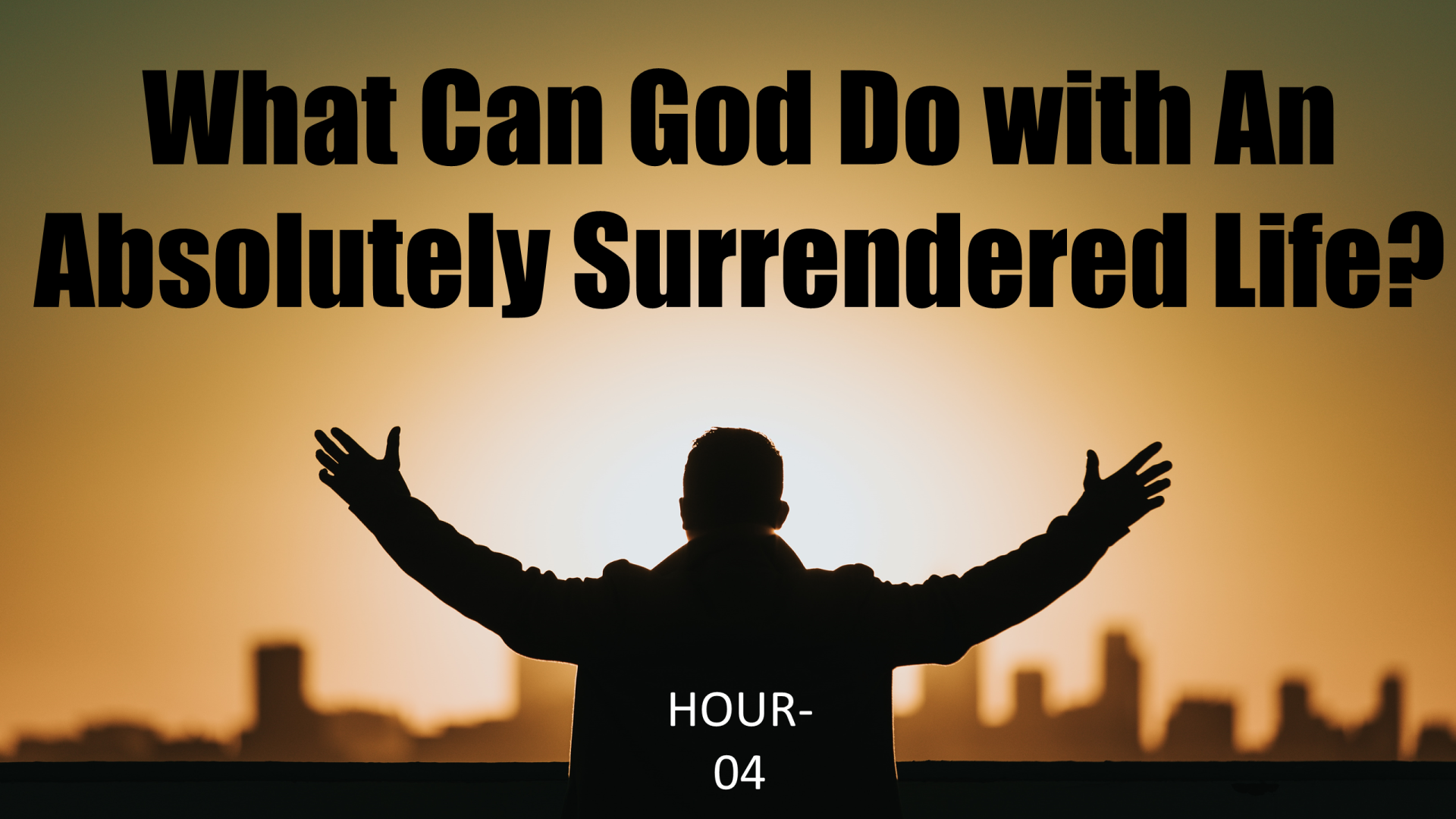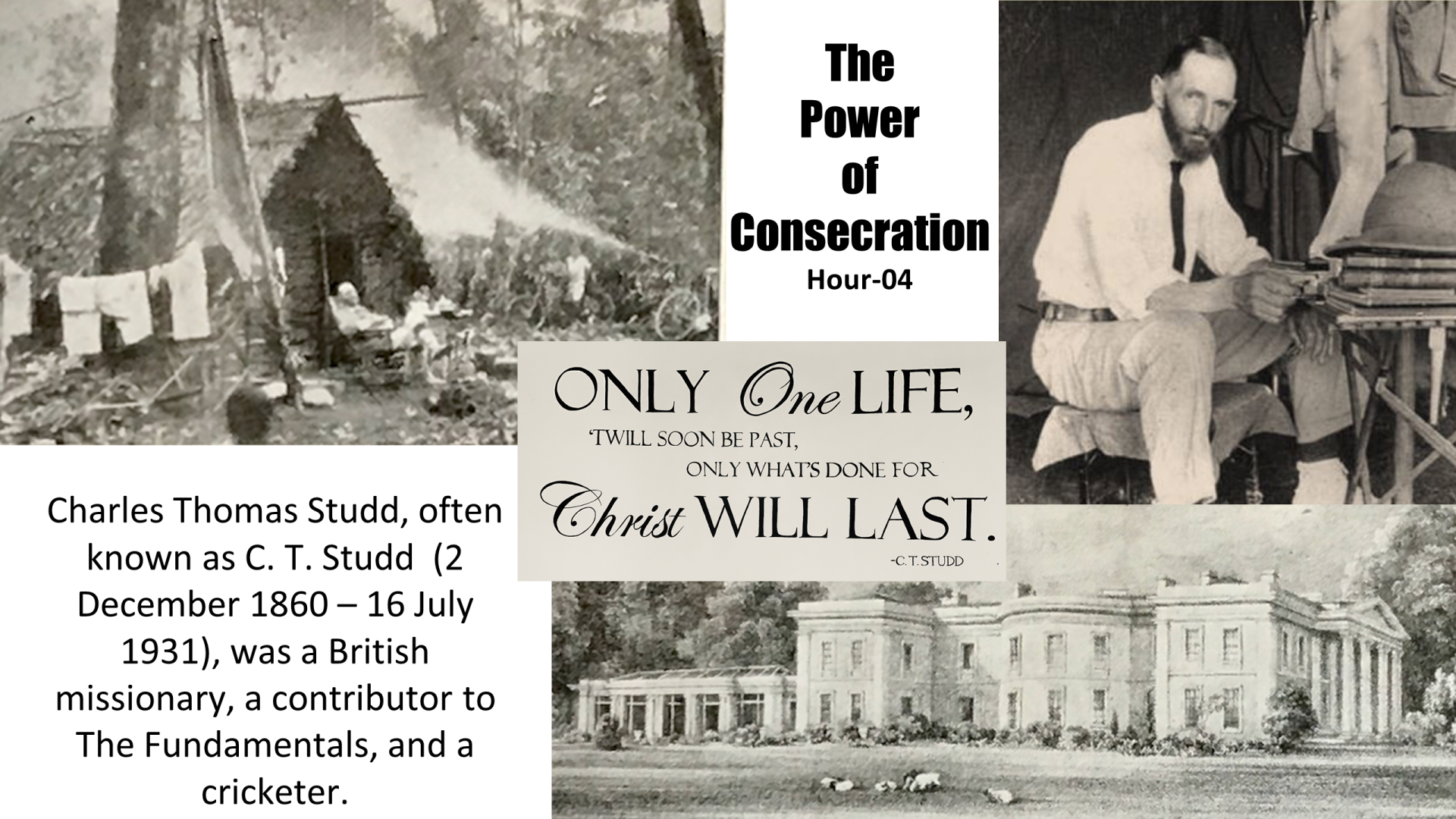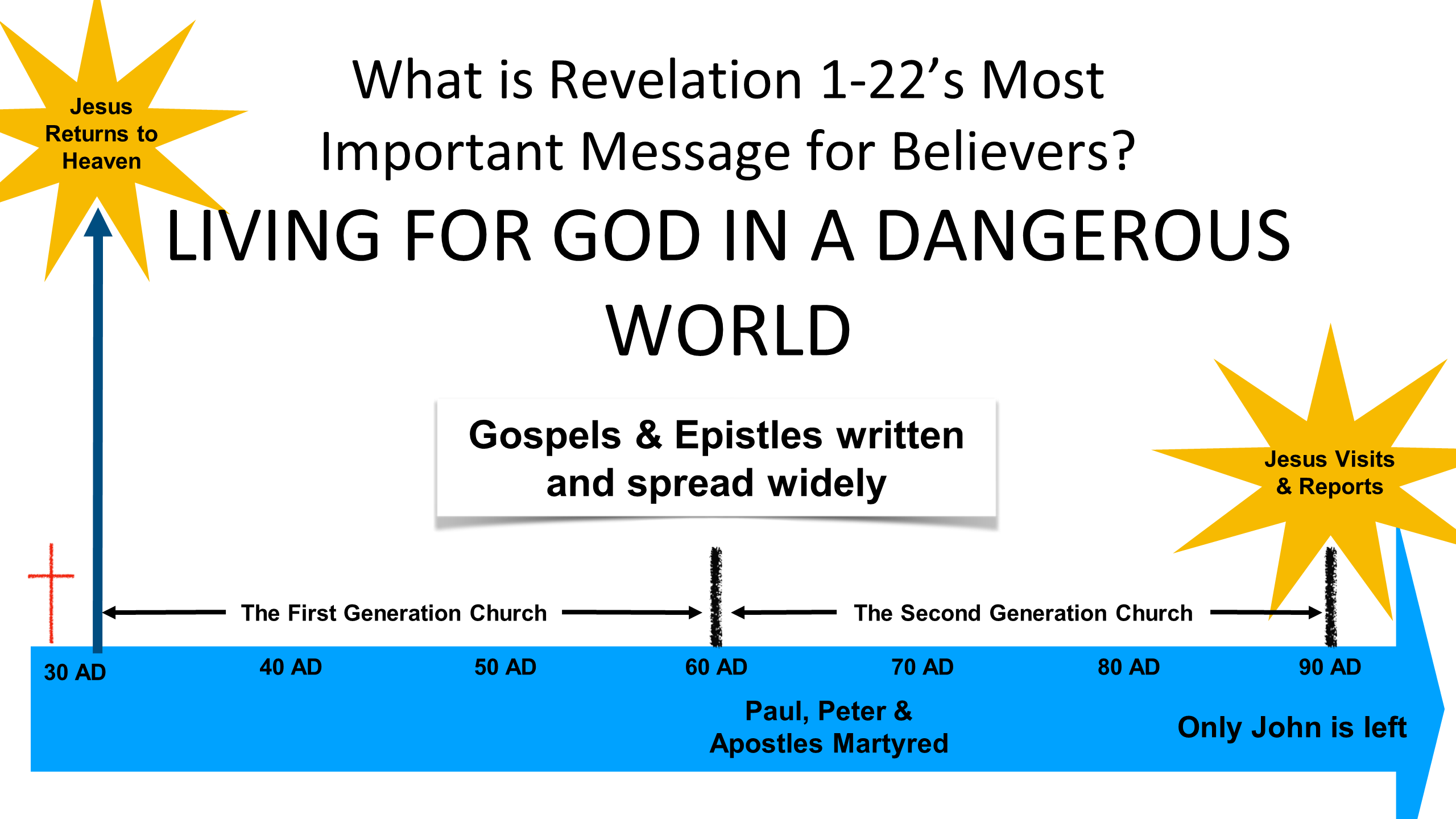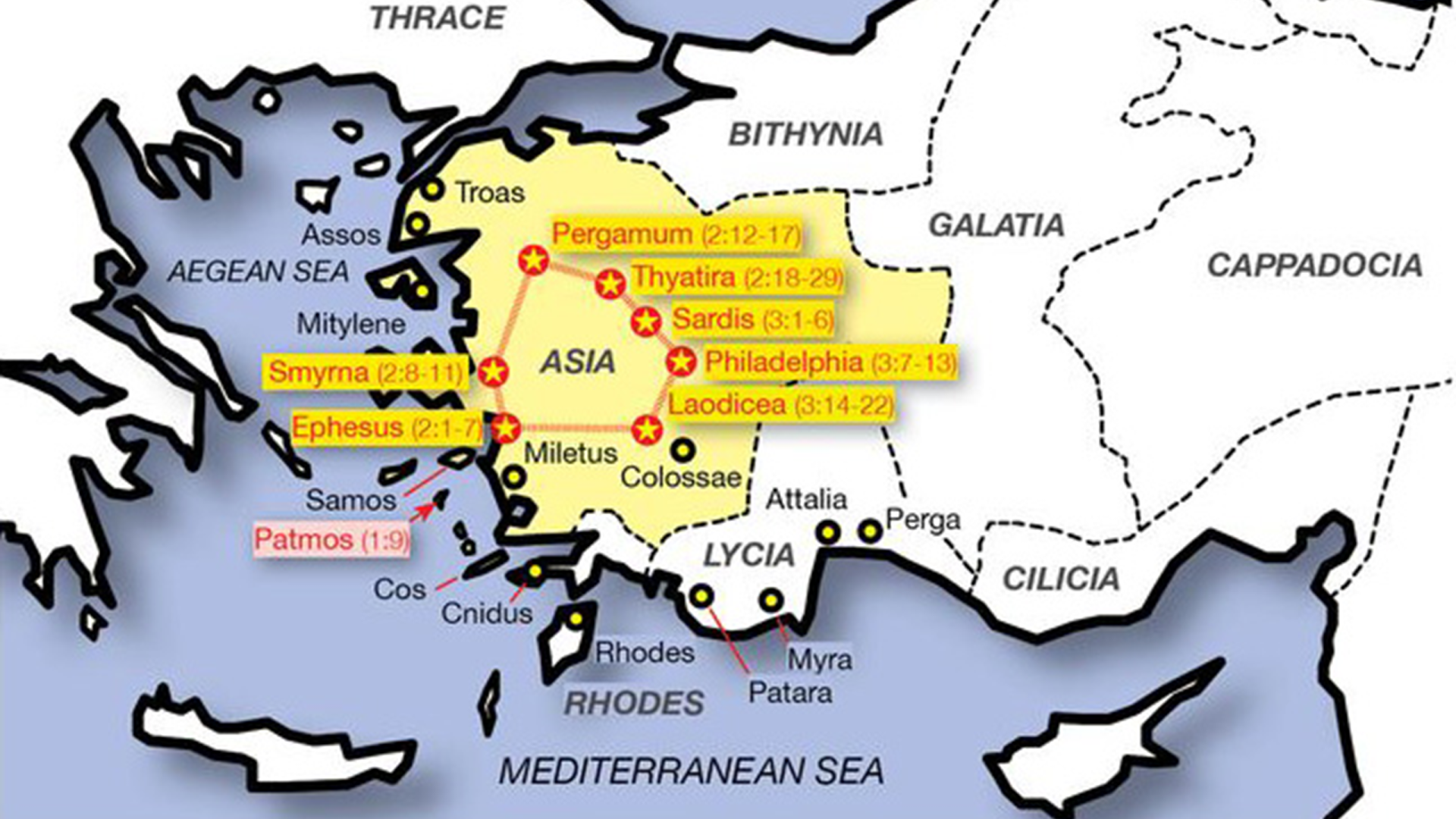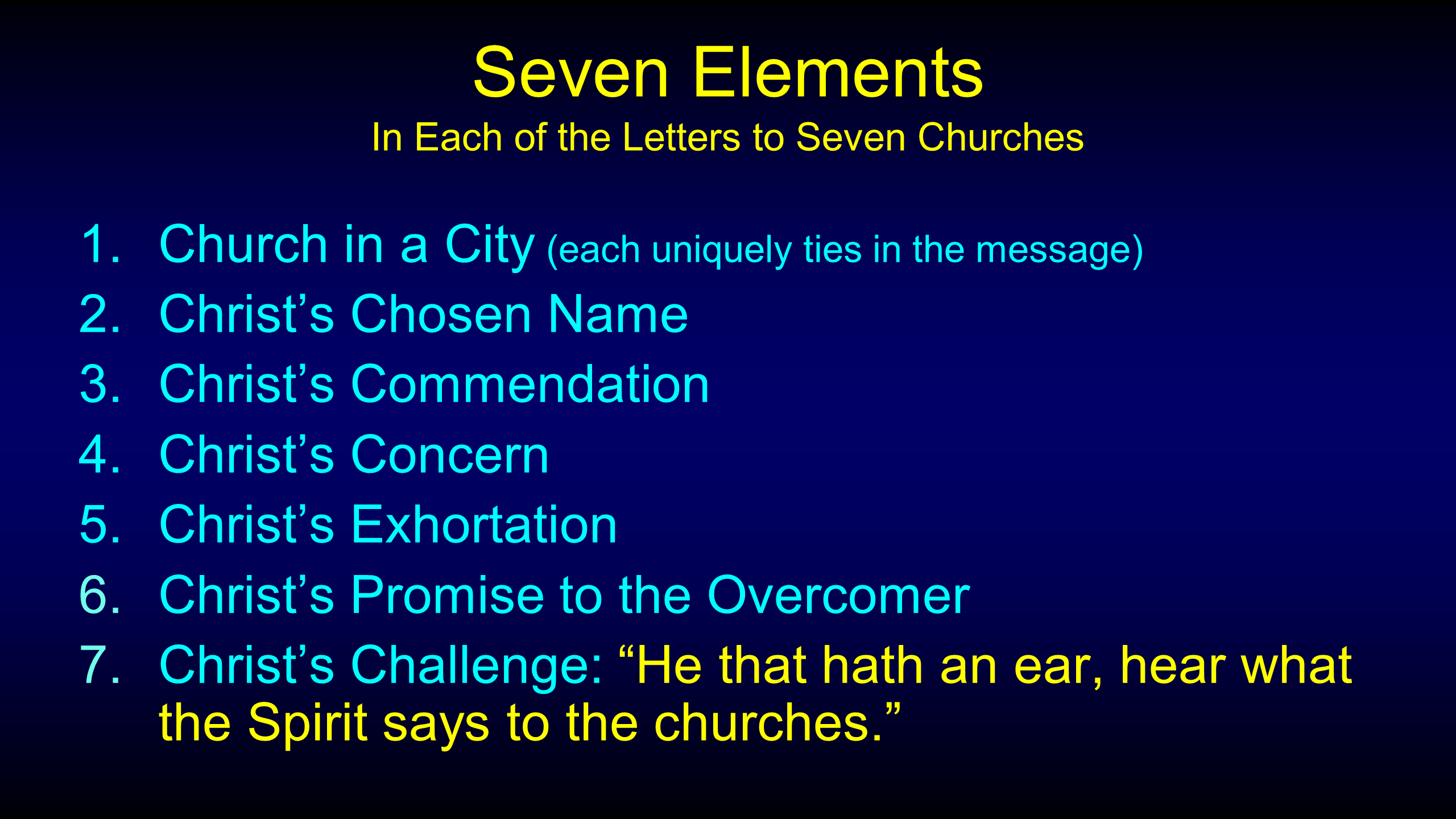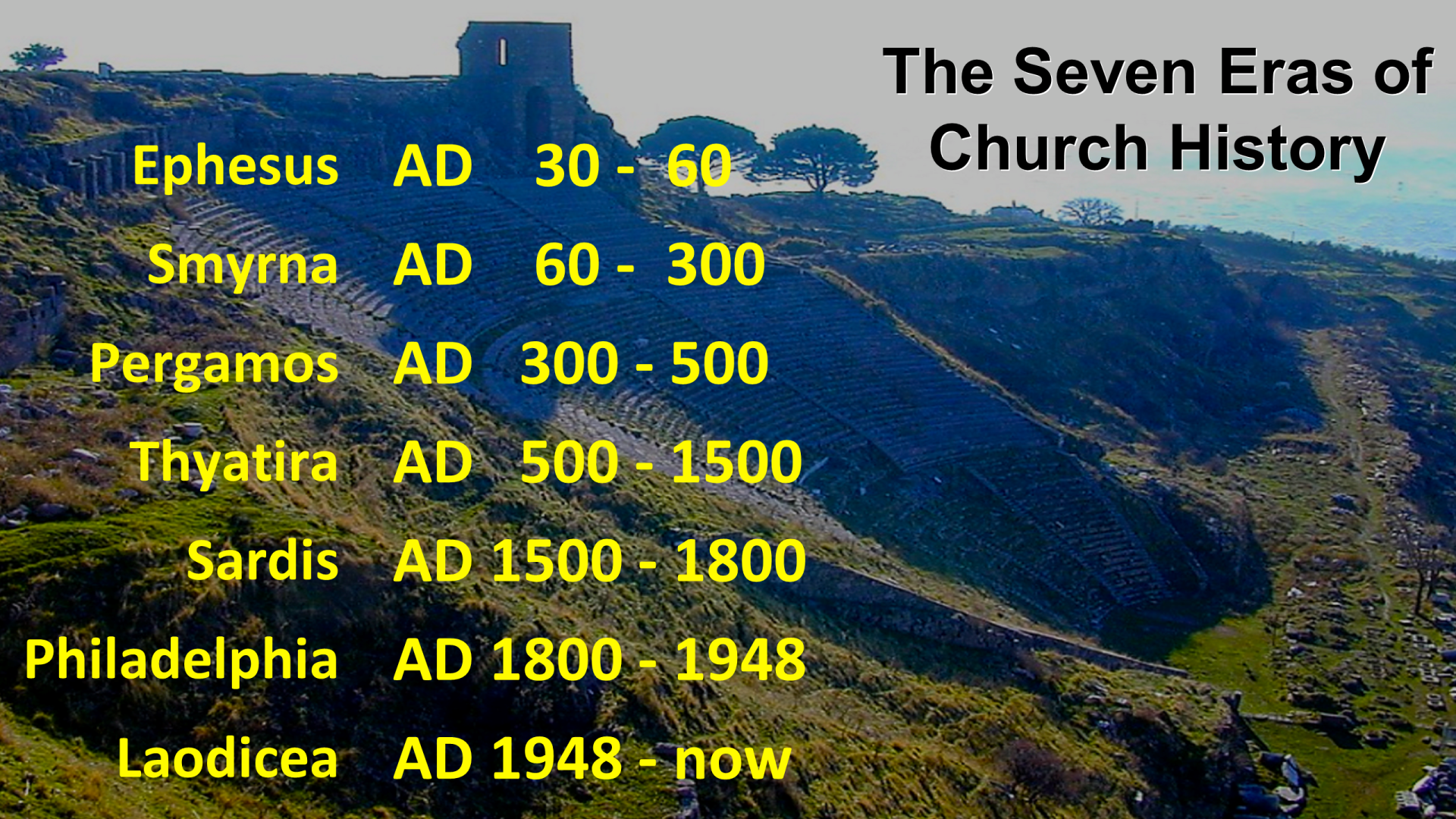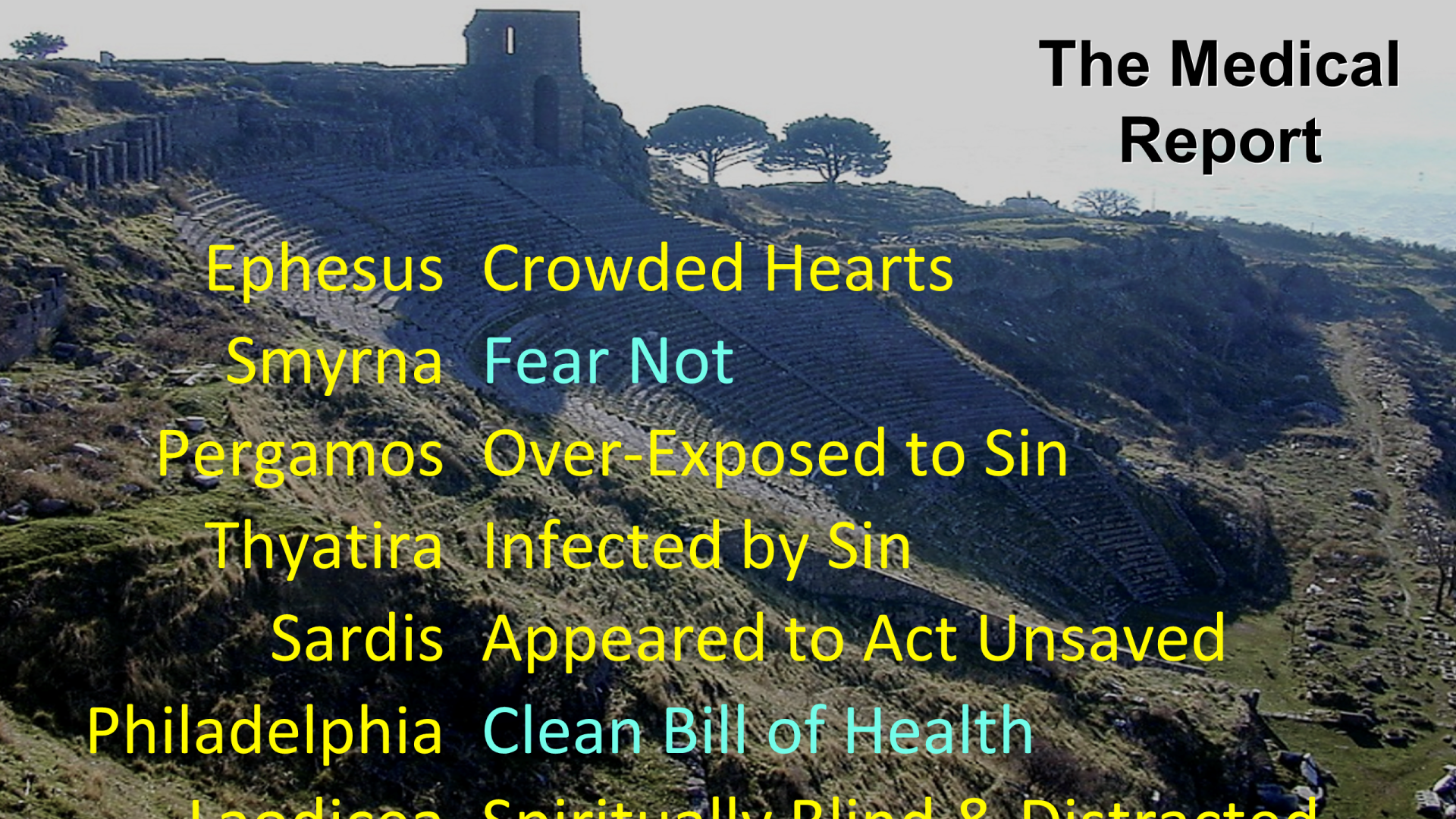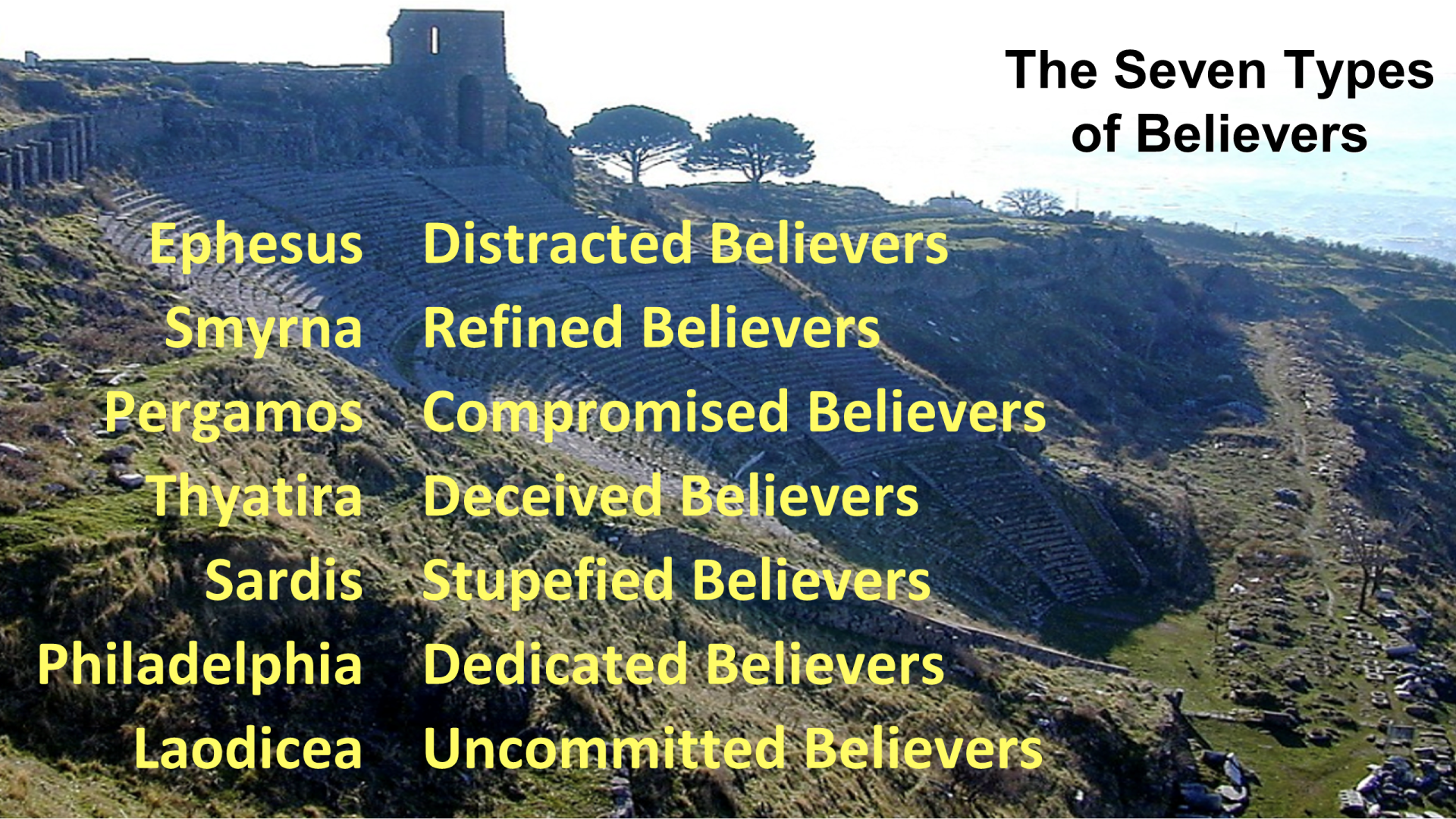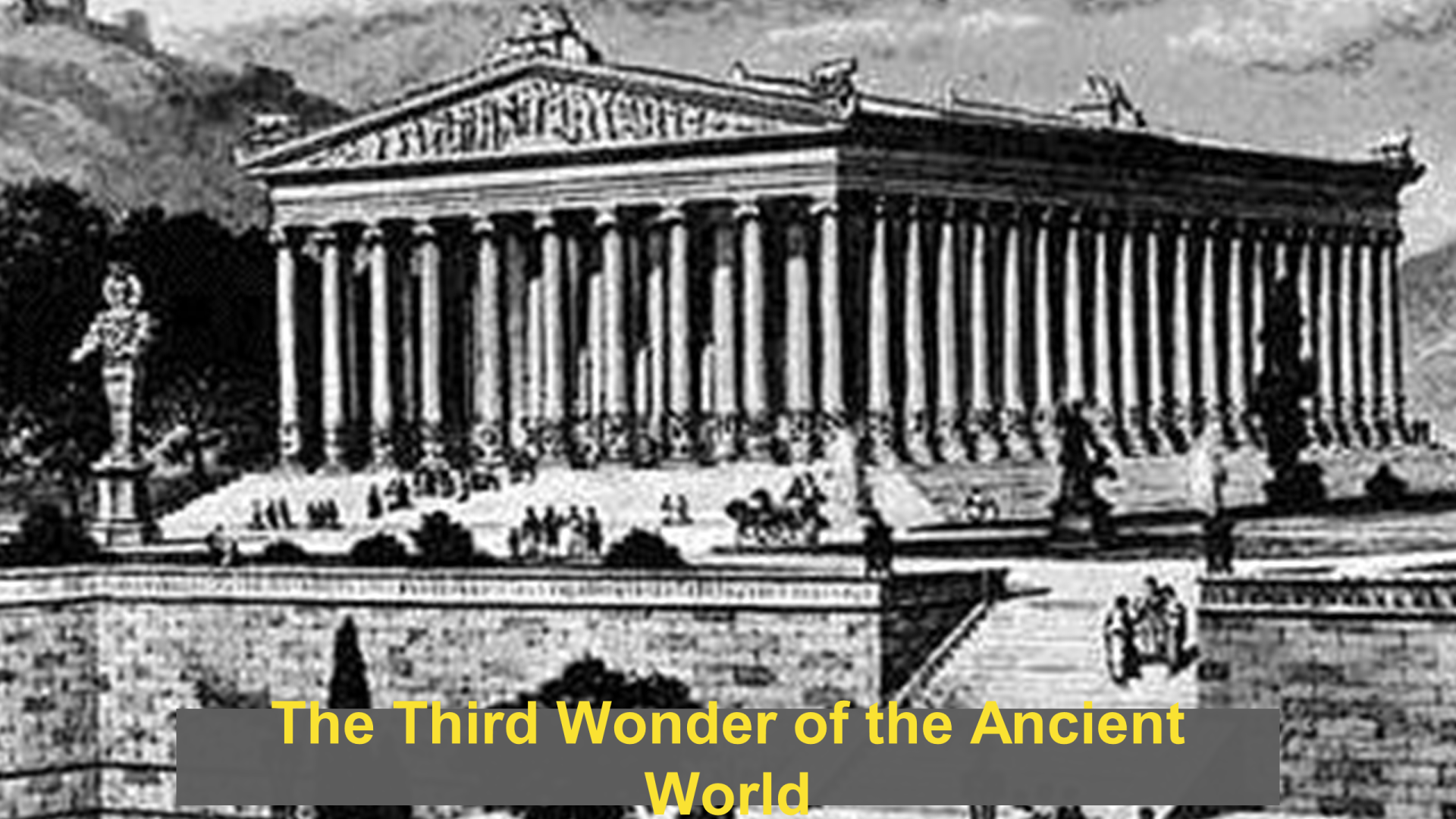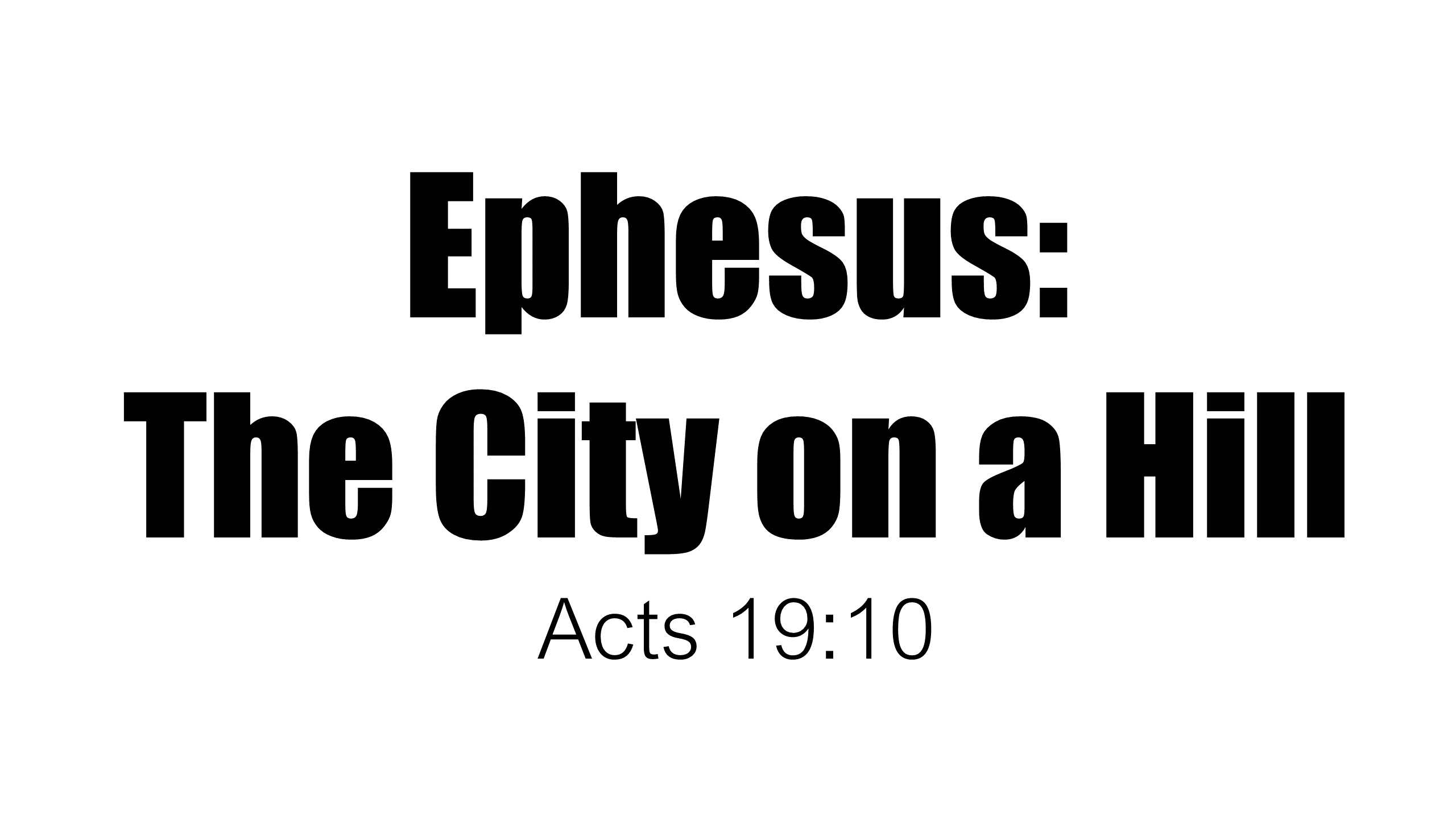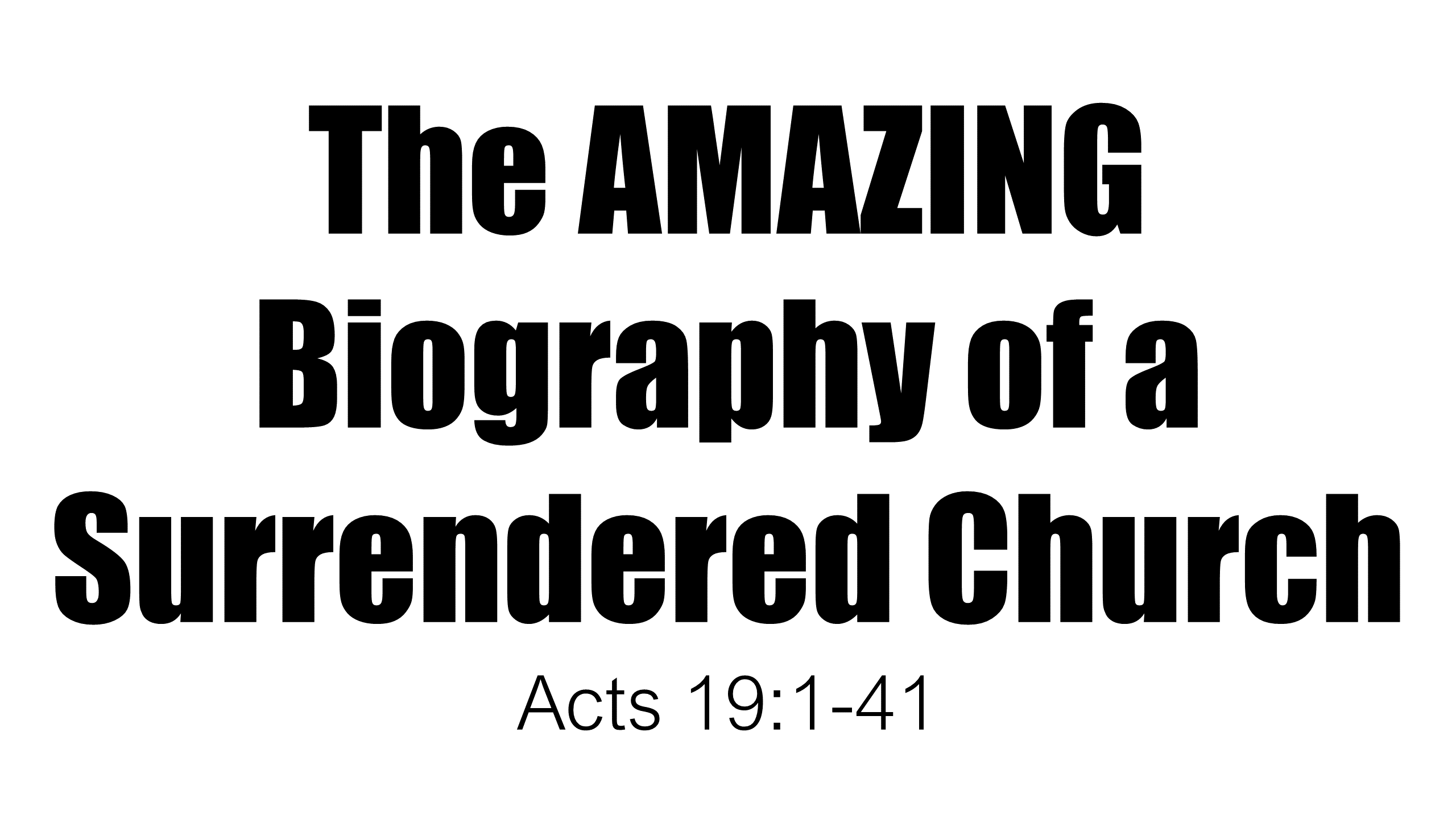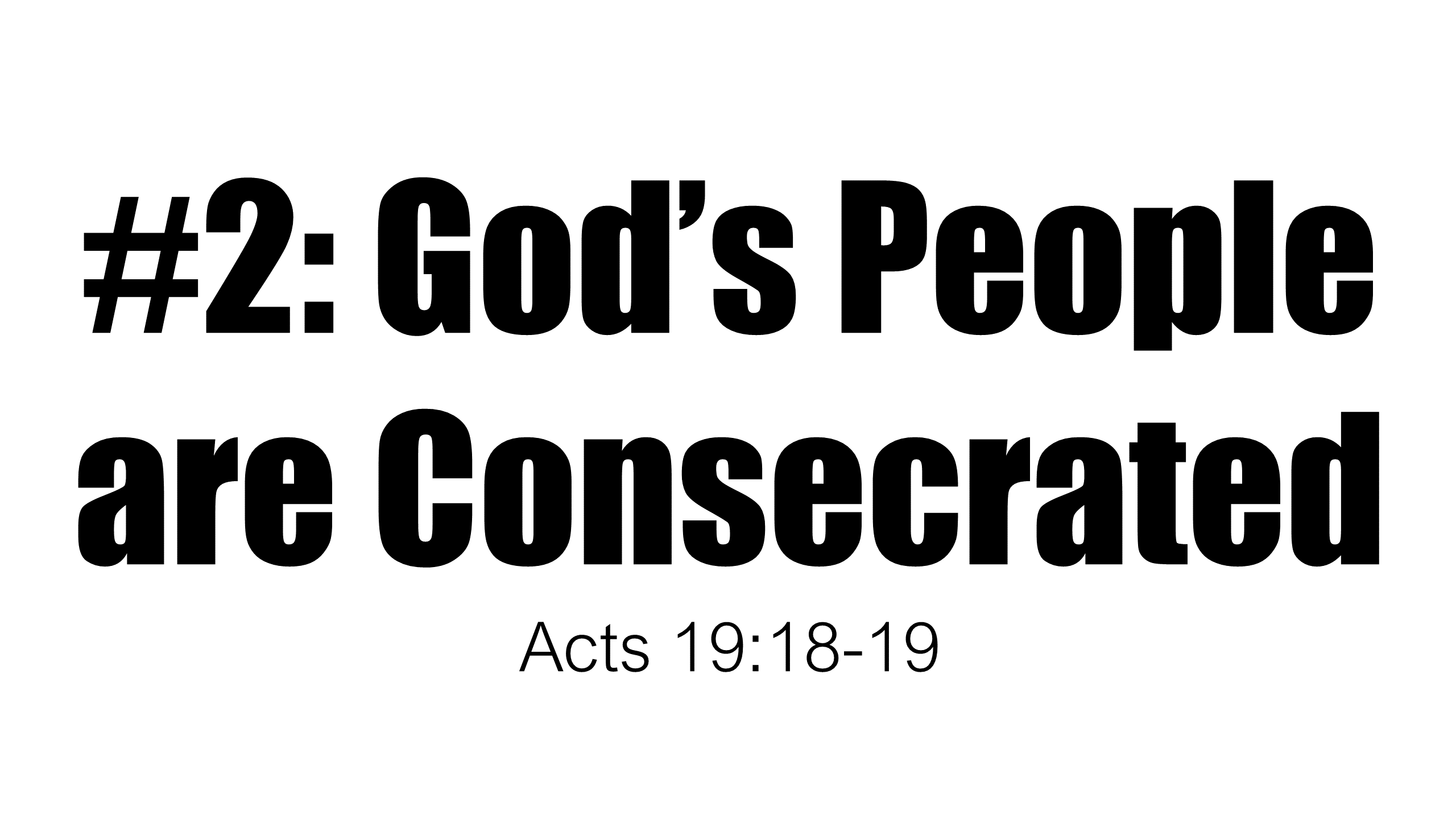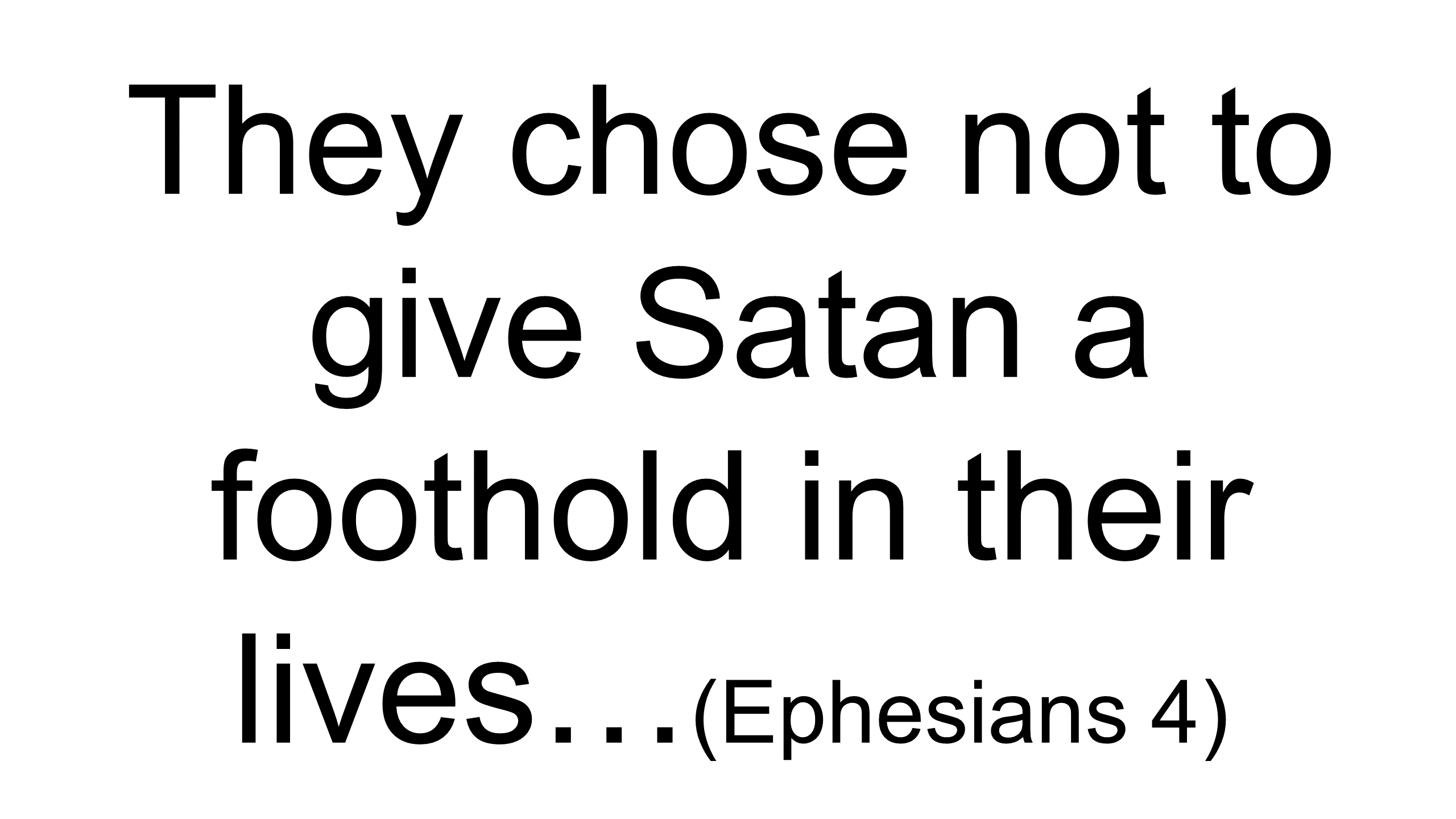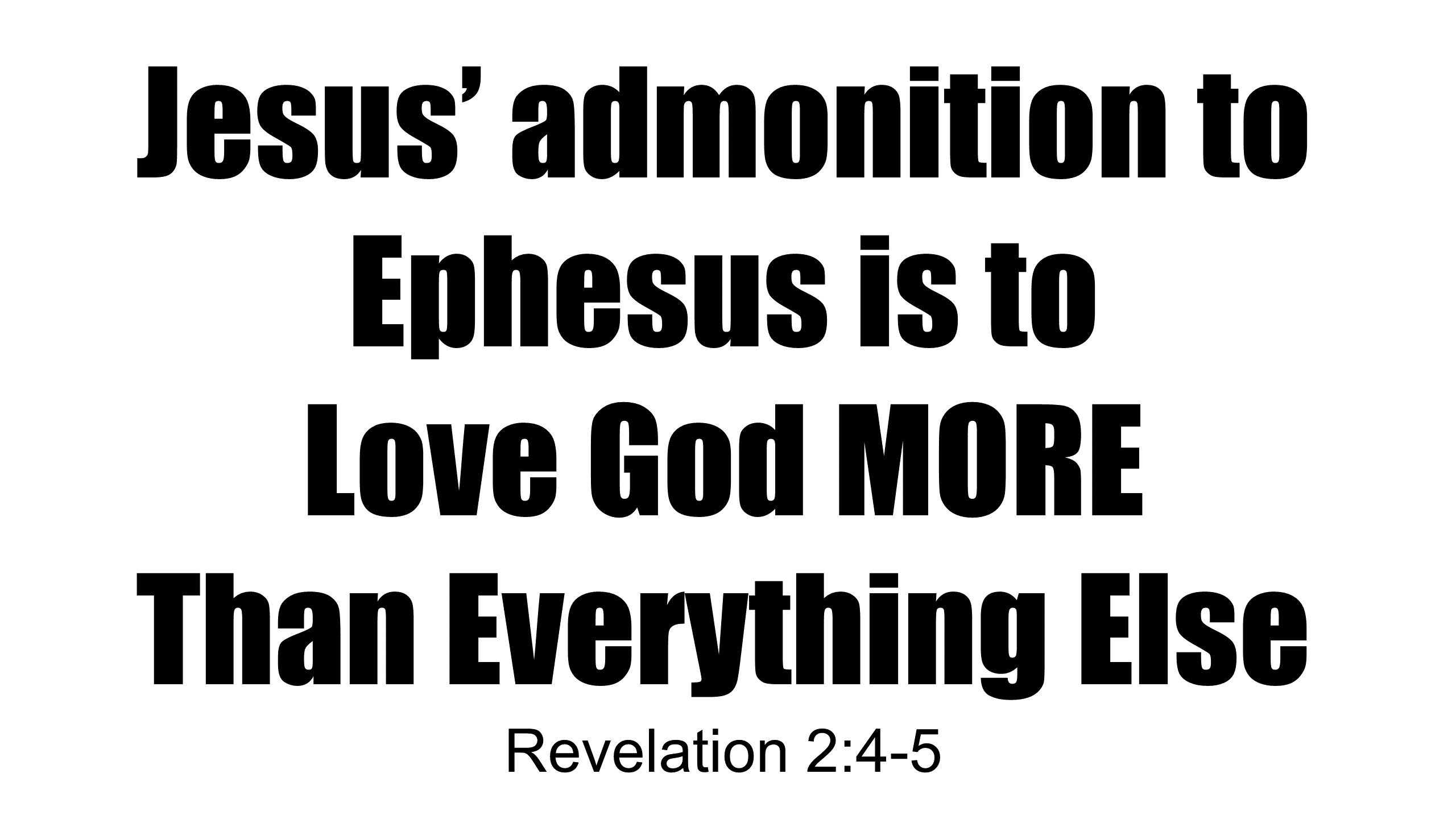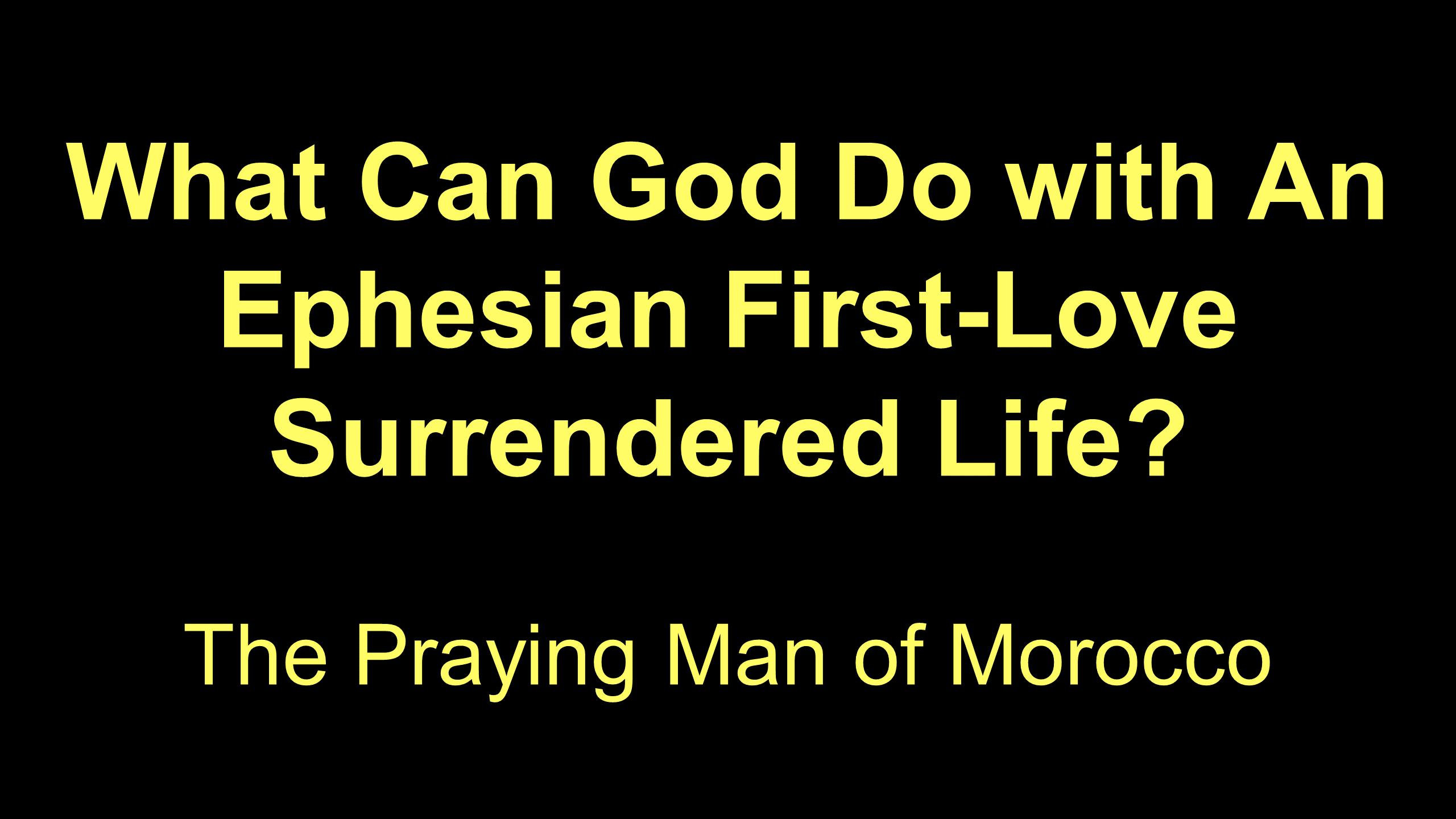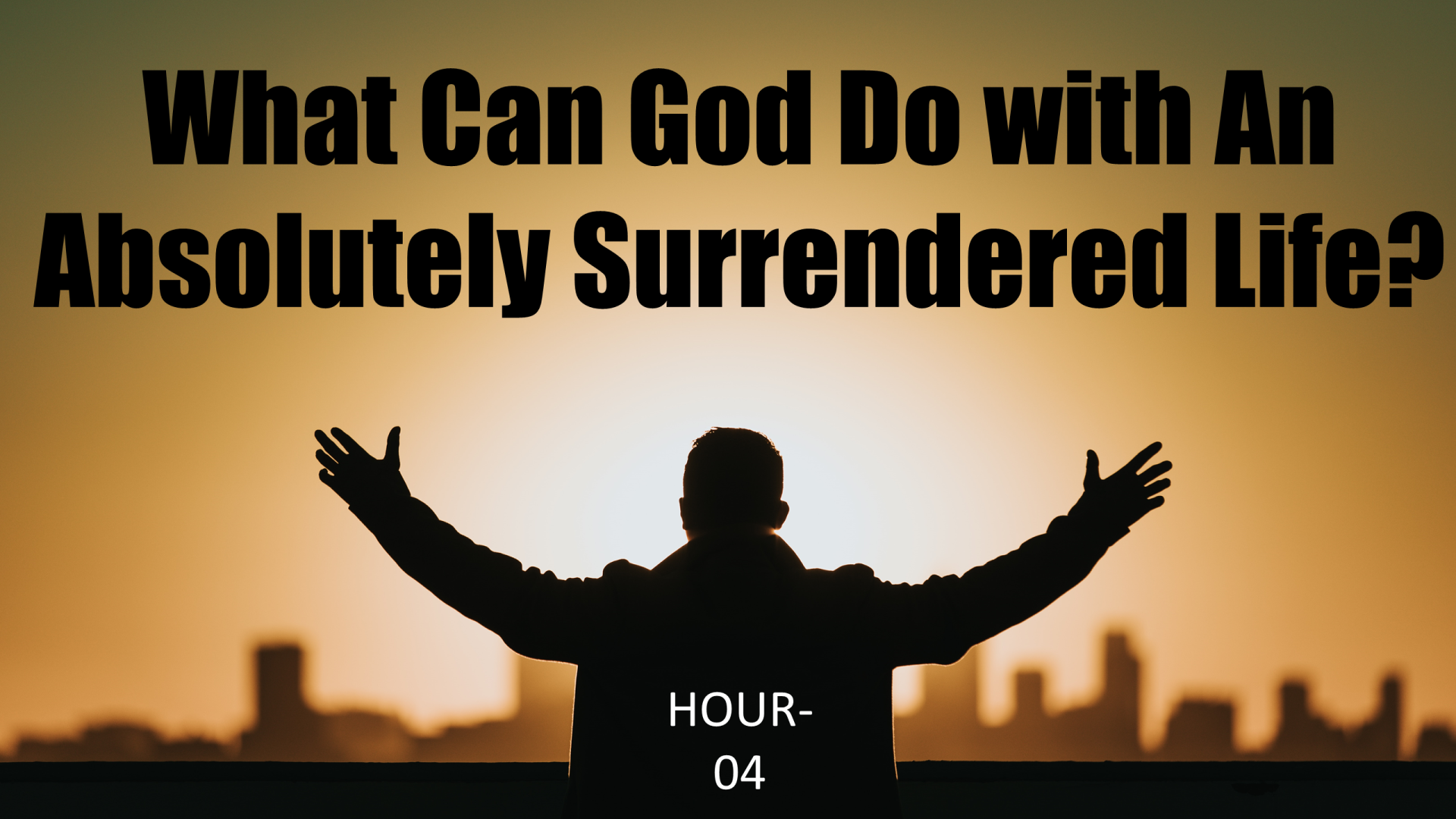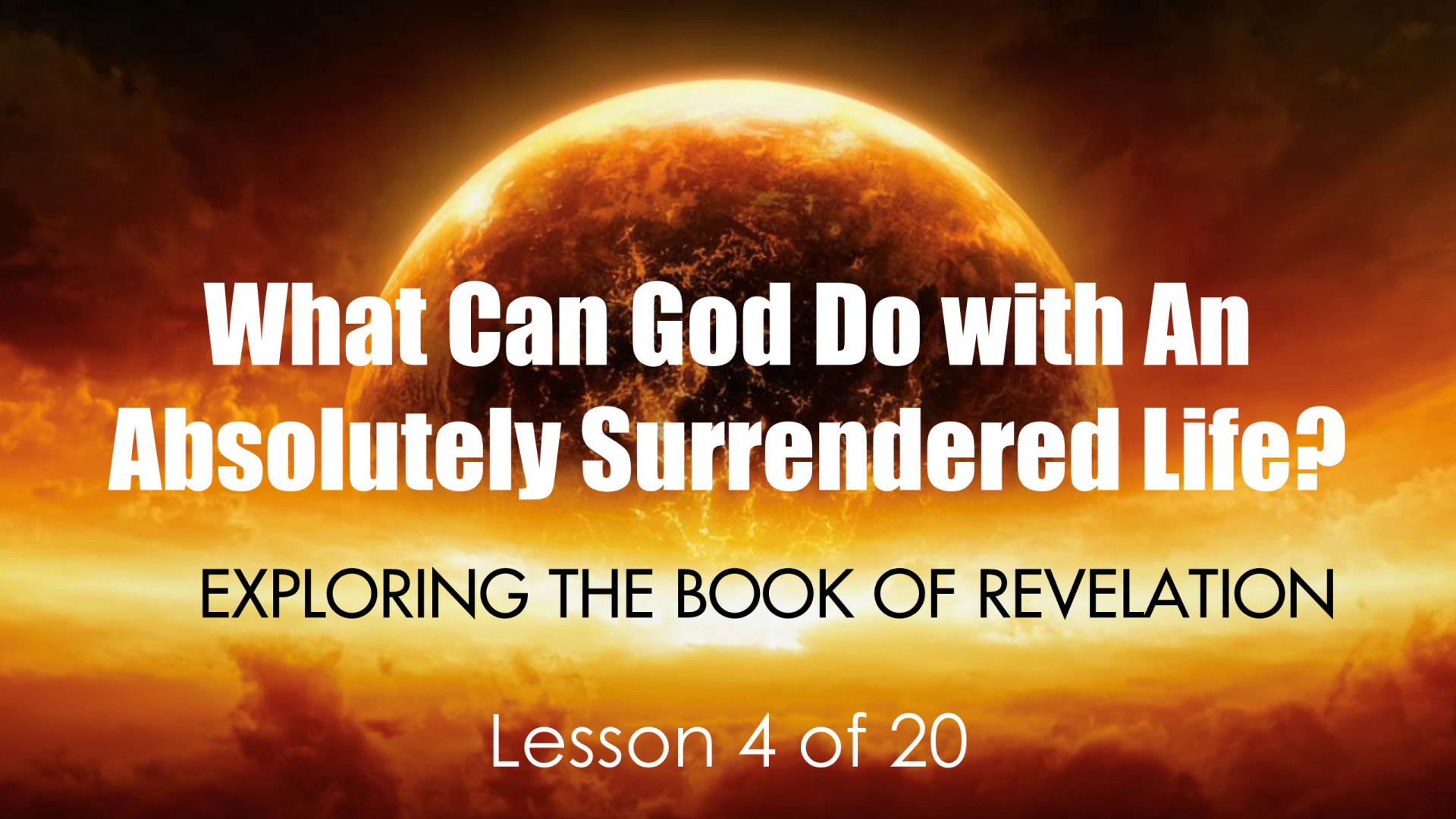2020Rev-04
200410AM
This is a 20 lesson course on the final book of the Bible. Revelation’s 404 verses contain over 800 quotations, allusions, and connections to the rest of the Bible. There is no new doctrine contained in these 22 chapters, only clarification on how they will come to pass. This is the ONLY book of the Bible Jesus came down to supervise as the conclusion of God’s Revelation. Moses went up to God to get the Pentateuch; Jesus came down to Earth on Patmos to show John what to write.
TRANSCRIPT
Welcome to our fourth class, going through the book of Revelation. We’ve come to the fourth lesson, which is probably the single most practical of all the lessons. Sometimes people ask, what can ancient cities, Ephesus, Smyrna, Pergamos have to do with me. What can the Bible, the last book, with all this apocalyptic imagery in it, have to do with me? The lesson is right here in chapter 2, the first 7 verses. I’ll tell you upfront, all the way through and at the end we’re looking at the power of a consecrated life. Now, before I read the text, before I pray, I want to ask you this…
If you’re really a believer, if you’re really a Christian, if you’re really a follower of Jesus Christ, what matters more than pleasing, serving, honoring, glorifying God; the father, the son, our Lord Jesus, and the spirit?
- A life that pleases Him is a consecrated life.
- A life that pleases Him is empowered by God.
That’s what we’re going to look at, the essence of a life that serves honors, glorifies, and is empowered by God.
So as you can see on the slide, as we explore the book of Revelation, what can God do with an absolutely surrendered life? This first slide reminds us of what Jesus said. Do you remember there’s nothing new in Revelation. I’ve told you that in each class, every element of Revelation is somewhere else. This element is in the sermon on the Mount. This is what Jesus said. Seek ye what? Say it out loud. First, the kingdom of God. And His righteousness and everything else will be added to you. That’s the power of a consecrated life.
I’m going to read chapter 2 of Revelation. You can follow along or just listen the first 7 verses and then I’m going to pray that I’ll be able to communicate to you this life changing marvelous message of how to have a consecrated life empowered by God.
That should be the highest priority. It should be what we think about all the time. I know right now in America, people are thinking about getting a mask, getting food, when am I going to get back to work, when will I get that stimulus check, those are all right here. Kind of down here in the mundane. I’m talking about what lasts forever.
Listen to the voice of Jesus. As He says these words, and John writes them down. “To the angel of the church in Ephesus write, these things says He who holds the seven stars in His right hand”. Remember every time I read this, these are all looking back at chapter 1. That’s actually verse 11, where Jesus is the one with the seven stars.
“ in His right hand, who walks in the midst of the seven golden lampstands.” That’s again, verse 13 of chapter 1, where we see Jesus as He walks around the seven churches. That’s how He identifies himself. He said, when I’m talking to you. He says, I want you to know I’ve been watching you. See Jesus writes this letter after He got to know them by action. We being in Ephesus in Smyrna and Pergamos and watching them.
Verse 2.
“I know your works, your labor, your patience, that you cannot bear those who are evil. You have tested those who say they are apostles and are not, and a found them liars and you have persevered.”
You’ve had patience. He says that twice you notice. And have persevered. Wow.
But He says you’ve “tested those who say there are apostles and are not, you’ve found them liars, you’ve persevered and had patience and labored in my name and have even not become weary”.
This is such a long list of Jesus saying, I see what’s going on in your life. “Nevertheless”, verse 4, “I have this against you that you have left your first love”. Let’s stop there, verse 4 and pray.
Father, I pray that you would open the eyes of our understanding to your word. I pray that you would turn this from just being more trues, more facts, more details, more history, more interesting insights and make it life changing. I pray for the power of a consecrated life to be the possession of every one of these students. There is no limit to what you can do with someone whose heart is completely turned toward you. Your eyes are running to and fro you’re looking throughout the whole earth for someone that will pay attention to the God of the universe. Lord right here, where I stand I’m saying, I’m here and I want you to work in my life. And I pray right where every one of the students watching this class, everybody that’s just stopping in for a moment today, just looking at some YouTube video, I pray they’d be kept captivated by your eyes, looking for them today. That they have a consecrated life that you can empower. Teach us about that today. For Jesus’ sake, we pray. Amen.
Well, the first seven verses of chapter 2. Talk about the power of consecration. Now the slide you see in front of you, is actually something I took a picture of, when Bonnie and I were serving in the United Kingdom a few months ago. We were staying with veteran missionaries. They have served in England as church planters across the British Isles, working with young people, reaching youth and planting churches. Remarkable couple. We stayed in their home and in that week we stayed there, I started noticing on the walls that they had collected memorabilia. Things from antique shops on some of the greatest servants of the Lord of all time that had lived in the British Isles. What you see on this slide are three separate pictures, that I took a picture of from their wall. That’s why they’re a little fuzzy.
The upper left is a hut in the heart of the rain forest of the jungle of Africa. On the right is a picture of the missionary, one of my heroes. We all have heroes.
- I don’t know who your heroes are. Maybe they’re financial, maybe they’re entertainers, maybe they’re musicians, maybe they’re business people, maybe they’re athletes, politicians…I don’t know. But this is one of mine. I hope you have heroes.
- Look at what your hero stands for today and forever.
- Pick heroes that aren’t just something today, but that are living for forever.
This guy did, his name was Charles Thomas Studd. You can read that on the side. He’s often known as C.T. That’s, Charles Thomas Studd.
- Born in December of 1860,
- graduated to heaven, the middle of July of 1931,
- he was a British missionary. So he was from the UK and his home by the way is the bottom right corner of that slide, Bonnie and I stood outside that home. It is today it’s become a British medical facility of some kind. I think it looks like a hospital, that was C.T. Studd’s home he grew up in.
- His father owned areas, the size of a State of the United States in India, where he used to grow all kinds products that he sold across the British Commonwealth, the United Kingdom. He was a mega, wealthy, successful businessman in the 1860s; His father, when C.T. was born.
- The upper left corner is the house C.T. lived until his death. It was a handmade hut in the jungle and C.T. wrote, see the center of that slide, only one life will soon be past, only what’s done for Christ will last.
You’ve probably heard that it’s hymn we sing in church. It’s a saying many people know in the back of their mind. It was the power of a consecrated life that C.T. Studd experienced. I’ll just read to you because he’s one of my heroe. I have several biographies of this man.
C.T. Studd served 15 years in China, six in India and invested his final 21 years in the heart of Africa’s vast, dark jungles. He moved among the fiercest cannibal headhunting Pygmies that he could find. He went to an unreached people group, all alone, moved in, only under the power of the Holy spirit. No one in their right mind would have gone there. No one in their right mind would have survived there. These people hunted humans and ate them. That’s what a cannibal is. He stayed there until his breaths became shallow and labored and his skin turned black because he was dying. He lived to his last breath for 21 years, reaching those demonized, savages who never had heard the name of Christ. Do you know what happened at his death?
His son-in-law came down. His name was Norman P. Grubb, and here was .CT.’s little hut. C.T. had a little fire in front of his hut. The week of his death, July of 1931, the word came out in the jungle and surrounding his hut slowly formed over 5,000 former head hunting savages, that had been cannibals. That had been murderers. That had been demonized. They had been under the influence of the local drugs that they could carve out of the flora of the jungle and become intoxicated on the influence of. Now born again, they sat in circles for the last week of his life singing hymns that he had taught them about the Savior who had transformed their lives. There were 20,000 that wanted to come. There was only room for 5,000 of them to sit and sing C.T. Studd into glory.
Formerly he was a lean, fit athlete. At his death he was gaunt and emaciated. All of his gleaming white teeth were broken. They were brown are long gone. He was stooped over, he halted with each step, but he’s surrounded by those thousands of glistening black bodies wearing banana leaves. By the way, when he met them before they were saved, they wore no clothes. When they were born again they began clothing themselves with the only things they could wear. They came to hear their beloved Bawana for the last time he spoke to them after only two hours of singing songs that he had lovingly taught them. They would sing “wounded for me there on the cross, He was wounded for me. Gone my transgressions and now I am free. All because Jesus was wounded for me.” In front of him sit 5,000 former head hunters. Their bodies are oiled, formerly the habitation of dark foul things, demons from the pit. Now, temples of the living God. I won’t read the rest. You should read the biography. C.T. Studd: Cricketeer, Pioneer … is what it’s called. One of the most moving life-changing biographies I’ve ever read. Do you know what the secret of his life was? His consecrated life.
- He got up every morning, 4:00 AM,
- read the scriptures for two hours sitting by his little fire there by that hut and the natives would come and watch him.
- Then they would ask him to tell them what the God of the universe had taught him.
Does anybody know you’re in touch with the God of the universe? Does anybody ever see you communicating with Him? Do you read His word? That’s what this whole lesson is about.
Well, let’s get to the next slide.
Revelation 1 to 22’s most important message for us, as believers is: we’re to be living for God in a very dangerous world. The most dangerous thing for us is anything that neutralizes God’s influence on our life. Anything.
- It can be a hobby.
- It can be an activity.
- It can be our health.
- It can be our diet.
- It can be our athletics.
- It can be the most distracting device in our current world right now
Whatever it is, God says, I want you to consecrate your life to me and seek me before everything else. That’s the only way that we will see God demonstrate His attributes. That’s the power to God, keeping His word. That’s the reality of Christ in us.
Well, to a group of people living on this map, do you see the map there? We’re on the first stop on the left side, Ephesus.
- these were literal people;
- living in literal places;
- with literal problems;
- with struggles going on in their life just like we have.
- That Jesus transformed
Now, the outline of this book, which is so important; which is going to be for those of you taking this for credit, a part of all your quizzes and your tests. There are seven distinct parts of the book of Revelation.
- We’re in the first part, chapter 1 through 3, in which this section is Christ’s church on earth. By the way, Revelation is just, if you read it, is it’s plain as day. You see church church, church, church, 21 times. That ends in chapter 3.
- Then we go to the second section, Christ’s church in heaven. We see the same people talked about in chapter 1, 2, 3, up in heaven, sitting around the throne. So, that’s Christ church in heaven. Chapter 4, chapter 5, and the beginning of chapter 19.
- Then we see all that awful stuff you’ve heard about the Tribulation events. That’s from chapter 6 through the end of chapter 18.
- Chapter 19. The fourth event is the return of Jesus Christ to the earth. It’s called His second coming.
- Then chapter 20 is about Christ earthly rule. Now you might’ve heard the term millennium, that’s a Latin word, Mille-ennium. Mille = a thousand. Ennium = years. Thousand years. It says it six times in chapter 20 ,that Jesus will reign a thousand years, a thousand years, a thousand years, a thousand years, a thousand years, a thousand years, a thousand years. That’s the millennium.
- Then we see the final rebellion, second half of chapter 20 and the great white throne, that judgment seat of all who’ve ever lived.
- Then dwelling in eternity in heaven.
That’s an overview of the whole book.
This section we’re entering into, in this class and the next couple of classes, is about this unique section of Jesus writing seven little postcard messages, letters to seven specific churches. Each, as you see on the slide in front of you, each of these letters has seven elements.
You see seven, here’s a term, there is a heptadic structure to Revelation. A heptad is a group of seven. It’s a unit of seven. There are so many sevens in Revelation. I don’t have time to rattle them all off right now, but here’s the first one:
- seven churches,
- seven letters to the seven churches
- within each letter, seven elements.
What are the elements?
- The churches are in a city. By the way the message is tied to the city where they’re living. It’s constructed and magnificent, a powerful way to communicate.
- There is Christ chosen name. Remember I told you, He goes back to those titles in chapter 1
- There’s Christ’s commendation. He says something about the church.
- Christ’s concern. I have something against you,
- Fiftly, His exercitation, where He says, no matter how many steps we take away from the Lord, it’s always one step back. That’s the expectation to repent that the Lord gives.
- Then there’s His promise to the overcomer. Every letter has that. If you look at verse 7 of chapter 2, it says “to him who overcomes I will give to eat from the tree of life, which is in the midst of the paradise of God.” That’s a code for a truly born again, Christian, whoever is born of God, overcomes the world. And so these are promises to us as believers. Every one of the letters has one.
- Then finally a challenge. This is so beautiful. The seventh element is always introduced by the same little structural sentence framework. “He, that hath an ear to hear what the spirit says to the churches.”
What’s that? Born again people have our ears open, that we now hear the voice of God. You know, this morning when it was still dark, I was listening to the voice of God. I actually heard Him talking. How do you hear Him talking? You read the Bible. When I read the Bible, I’m listening to the voice of God.
Well, each of these seven churches also portray what we call an era, a period of time, of church history.
- Ephesus is like the early Epistolic time, 30 to 68 AD.
- Smyrna is like the suffering time when Nero started cranking up the persecutions, all the way through Diocletian.
- Pergamos is like the middle ages, dark ages period as Rome was declining and the church was rising.
- Thyatira is that time where the Roman Catholic church basically dominated Western society.
- Sardis is the Reformation time and beyond. When it, the church, was dead and then life comes to it.
- Philadelphia is the great missionary era, when C.T. Studd was out there working in the heart of Africa.
- Laodicea basically is modern times.
Also the churches not only portrayed eras of church history, they portray the medical condition of believers in the first century and in every century since. Wherever you go to church, wherever you’ve attended church, there are seven types of people that attend that church. That’s what Jesus said. This is what the church looks like.
- There are Ephesian people, see on the chart, they have crowded hearts. Yeah they’re saved but boy there’s a lot of other stuff going on in their lives. They’re balancing it all instead of letting Christ be the one they seek most. They just try and keep all the balls in the air.
- There are also Smyrna type of people that are suffering.
- There are also Pergamite people, they’re overexposed to sin. They’re entertained by sin or they listen to sin or they watch sin or they’re just entertained. They’re comfortable around sin.
- Thyatirans, they’re not just exposed, they’re infected.
- There are Sardis type Christians. They appear to act unsaved. Every church I’ve ever pastored, for 40 years, there were people in the church that I would ask the Elders or the Deacons. I would say, is that person a Christian? They go, Oh yeah they’ve gone there their whole life. I said, no, have they been born again? And when I really pressed it, they say, I don’t know. They were baptized, they’ve joined, they come, they give, but there’s no evidence. There’s no evidence that their eyes have been opened, that they’ve been turned by the spirit of God from darkness to light. There’s no evidence that they have spiritual hunger. There’s no evidence of the Holy Spirit in their life.
- There are Philadelphians in every church, praise the Lord. As a pastor you always gravitate to these because they’re the ones who are just living the Christian life. They love to read the Bible. They love to share the gospel. They love to pray. You ask them to do something they want to serve. You ask them to apart of anything and their only problem is they want to do everything. Usually there’s a core of these in every church. They’re the backbone of the church. Not the rich, not the famous, not even usually the most educated. They have a consecrated life, they’re like Philadelphia
- Then there are the Laodiceans. They’re spiritually blind and distracted. They’re the ones that say I don’t get anything out of the Bible. I don’t like to read the Bible. It’s kind of heavy. It’s kind of hard to understand and boy are they distracted. They have every gizmo, they have every pursuit and God is just one of them.
So therefore the seven types of believers that even I would say, every one of you watching this. Every one of you, who are born again Christians are either:
- distracted, or
- refined, or
- compromised, or
- deceived, or
- stupefied, or
- dedicated, or
- uncommitted
God says you’re one of those seven. If you’re one of those seven, that’s not pleasing to God it’s always just one step back. Repent and come to the life of consecration.
Well, let’s look at what first love for Jesus looks like in the first seven verses. You notice what it says in verse 2. “I know your works,[…] your patience, and that you cannot bear those who are evil. And you have tested…” that whole list. Ephesus was Jesus’ most successful church. That’s why they’re listed first.
- No church received more commendations than Ephesus. In all of these letters this is at the top. The most commended church.
- Ephesus was in top spiritual condition, optimal health, except for they were slowly having heart disease, coronary disease, cardiac problems.
- Outwardly they didn’t look sick at all. They were operating.
- This is the church that we see what loving Jesus most looks like.
And that’s what I want to go through in our little time we have. Ephesus talks to us about the three choices of a surrendered or consecrated life.
The saints at Ephesus were heirs to the apostle Paul’s longest and most powerful ministry.
- Paul spent three years ministering there. He stayed here longer than any other city.
- When he left, he passed the pastoring to a spiritual son, Timothy, and he sent back not one but three letters. Ephesians, 1 Timothy, 2 Timothy. Remember 1, 2,Timothy were sent to Timothy when he pastored that church.
- This is where Jesus’ mother Mary lived and where she died.
- It was from Ephesus, John was arrested by Domitian and exiled to Patmos.
- Notable Christian leaders: Apollo, Tychicus, Priscilla, Aquilla and others ministered there.
- It was an incredible church. The saints of Ephesus overcame the same pressures facing us as believers today.
What was Ephesus like? It was a pleasure seeking culture and a mind assaulting media and a materialism dominated way of life. Does that not sound like 21st century life in Western culture, USA, Western Europe, the Commonwealth, over in Asia and the wealthy parts of Asia. That’s what I’m describing the pleasure seeking culture. That’s what people seem to live for:
- the concerts and everything else.
- the gaming,
- the mind assaulting media, and
- materialism dominated living.
For 40 years Ephesus had stood as a beacon in the shadow of the next slide.
Do you see what’s there? It might not look like anything to you, that was the largest building ever built in the ancient world. Now some of you are saying, what about the pyramids? The pyramids are not buildings.
- This was a building the size of a city block. You go to New York City and look at the size of a city black. That’s this building.
- It had 60 to 100 foot tall columns, 127 of them covered with gold.
- This is one of the wonders of the ancient world. There were seven wonders. This was one of them.
Jesus writes a list of commendations, and He gave also one serious warning and a promise. He sent it by messenger, from Patmos where John wrote it down, on a boat to Ephesus. As that letter came to Ephesus, that arrived in the port and the moment the messenger walked off the boat and toward the city holding this letter from Jesus, the first thing he would have seen would have not have been;
- Not the bustling Harbor team who has boats,
- not the roads lined with exotic goods from trade routes, all over the world,
- but the largest building in the world on your screen, the great temple to Diana, Artemis of the Ephesians standing 10 stories high.
Taking up an entire city block. The temple of Diana or Artemis in Greek was completely covered and overlaid with gold. It gleamed the sun directly into the center of the city. It became third of the seven wonders of the ancient world.
In and around Diana’s temple, prostitutes both men and women lured people for unbridled immorality in the worship of Diana, the goddess of sex and fertility. Can you imagine a temple dedicated to sex and fertility with free prostitutes. Male and female. That’s what Ephesus was. It was a magnet. Not just for the sexually enslaved. It was the center of black arts, of witchcraft, of superstition, of the power of Satan. And that place is the place where God chose to plant the greatest church of the ancient world.
Ephesus, as you see in the next slide, was a city on a hill. Now let’s do a quick biography of Ephesus. Take your Bible. Turn back with me to the book of Acts chapter 19. There’s a whole chapter of the Bible devoted to the founding of this church. This was an incredible church. This was a vibrant church. But most of all, as I was just telling you, it was a city set on a hill. Ephesus was the magnet for travelers. It was a magnet for all types of people that were involved in commerce or involved in the arts. It was a combination of New York City, Los Angeles, and Shanghai all put together. Through the harbor and through all the trade routes that went through Ephesus, flowed the world.
This is what it says in chapter 19 of Acts, in verse 10. “And this continued for two years, so that all who dwelt in Asia heard the word of the Lord Jesus, both Jews and Greeks”. What continued? Well, it says in verse 9 that Paul taught every day and reasoned with the people. How could everybody hear about it? Because Ephesus was the hub.
Here’s Ephesus and through it, the trade routes, like the Ignatian Way and to its harbor came the boats. So it had all of the boat traffic and all of the land caravan traffic going through. So this hub, if you could get a product into Ephesus, it would either go back out on a boat or it would go down the trade routes. If you could get an idea, a truth, a concept, something new, it would go out with all of the Mariners and it would go around both East and West with all of the land traffic. So, as God’s word says, all who dwelt in Asia heard about the Lord. God planted Ephesus in the shadow of that largest building of the ancient world to be a light for Him.
It wasn’t just a major Seaport. It was known as the gateway to the entire continent of Asia. Do you see why God planted the church there? God picked this as his biggest church so the gospel would go global. That happened just like I shared in the life of C.T. Studd, because Paul was willing to go into the shadow of the blackness of Satan’s territory and shine the light of the gospel. Wow.
Quick biography of Ephesus.
- It was the longest ministry investment of Paul.
- It was the greatest revival of the New Testament era.
- It was the largest church in church history.
- It was the first love church of revelation 2 and 3.
- It has the most detailed words on spiritual living. Ephesus has the epistle to the Ephesians.
- The little epistle, six chapters to those living in Ephesus, form for us the clearest description of how to live the Christian life and be that city set on the hill for the Lord, wherever we are.
Well, the amazing biography is in all 41 verses of the 19th chapter. Many notable authors have written books. In fact, when I was in Seminary and Bible School in the seventies, they were just a shelf of books on how to have a successful church. There are many books and manuals on how to make the church successful but if God was to write one, what would He say the secret is of a successful church? Well, He did write one. That’s what Acts 19 is. Acts 19 is the authorized biography of the powerful church in Ephesus, and it’s a biography God wrote.
See, look at Acts a little differently. God is showing us in Acts how He uses consecrated people, empowered by His Spirit to do unbelievable things. In Acts 19, we find the timeless keys to what makes a church God can use greatly. By the way, what is the church? It’s a bunch of living stones, a bunch of individual people that are consecrated and empowered that together form a temple of God, that lights the area of where they serve. So how does God do that?
Throughout history and every culture, no matter what century you live in, what does a powerful church look like? Three keys.
First one chapter 19 verse 11. God’s son is magnified. Listened to Acts 19:11, and it says “Now God worked unusual miracles by the hands of Paul, so that even handkerchiefs or aprons were brought to from his body to the sick, and the diseases left them and evil spirits went out of them.” Wow. And look at verse 17 of chapter 19, and “this became known both to all the Jews and Greeks dwelling in Ephesus; and fear fell on them all.” And look at this. “And the name of the Lord Jesus was magnified.” Number one, in a successful church and I might add in a successful life that’s consecrated to God, God’s son is magnified. What does that mean? It means that Jesus is a part of my life.
- He’s what I talk about.
- He’s what I think about.
- He’s what I live for.
- And if you’re around me very long, you’ll find that out. That means it’s magnified.
All of us magnify something.
- Some people magnify themselves.
- Some people magnify their problems or their hurts or their troubles and woes.
- Other people magnify their company or whatever they’re pursuing.
- But someone who’s useful to God magnifies God the Son.
By the way, this city experienced something, unlike any other time in Paul’s ministry, God didn’t do miracles like this all the time. In fact, what went on in Ephesus never went on anywhere else. It was unprecedented. In Ephesus, because Paul’s only goal was to magnify Christ,
- he didn’t care about magnifying his own ministry or
- his own name or
- his own status
God unusually blessed Paul’s ministry like no other time in his life.
Like always, the power of God attracted counterfeits and a clever group of opportunists wanting to get in on the action. So they started selling God’s power. This group, this seven sons of Sceva, they would go around and say, Hey, we can do what Paul did. We can cast out demons. We can do all this. That’s the setting, look at what happens.
It says in verse 14 of chapter 19, “there were seven sons of Sceva, a Jewish high priests, who did so. And the evil spirit answered and said, Jesus we know, and Paul I, know; but who are you?”
See, they were trying to market the power of God that Paul had and they said, they had it. “Then the man,” verse 16, “whom the evil spirit was leaped on them, overpowered them, and prevailed against them, so that they fled out of the house naked and wounded.” And this became known all over Ephesus.
The lesson, God looks for men and women who are willing to work unhindered by
- the sacrifice,
- laboring with an undivided heart,
- proclaiming the undiluted message,
- investing in a humble occupation
to make the gospel of Christ known and God will do the work. The fakes said they had the power, they didn’t and the demons showed them to be charlatans.
When I told you about C.T. Studd, my hero, he moved to the heart of Africa. It says in his diary, he brought his main equipment. He brought two Bibles. He wrapped both of them in oil cloth, that was like a Ziploc bag 150 years ago, so they wouldn’t get wet in all the canoe rides and if they ever tipped over. He had two of them in case he lost one, because he was going to be there, he knew, the rest of his life. His entire ministry was based on him getting to know God so well through His word, that whenever he got to talk to someone he told them what God said.
That’s what it means when God’s son is magnified.
- I want to know Him.
- I want to know His power, Paul said.
- I want to speak His word because it’s the word of God that’s living and powerful and changes lives.
Okay. Number two, not only is God’s son magnified, number two, look at verse 18. It says after Christ was magnified chapter 19, verse 17 “and many who believed came confessing and telling their deeds. Also, many of those who had practiced magic, brought their books together and burned them in the sight of all. And they counted up the value of them, and it was totaling 50,000 pieces of silver.” God’s people are consecrated.
What is consecrated? Can you say today, if I ask you, if we had a quiz; bowed your head and raised your hands or wrote on a piece of paper, do you think your life was consecrated to Christ? What would that mean?
Well, what does it mean here?
When God’s son is magnified, choice number two is: God’s people are consecrated. When Paul originally began spreading the gospel in Ephesus, he was not talking to commendable God honoring saints. He already described in the book of Ephesians, what these people, when he got here, what they were like? This is what he says.
They walked according to the course of this world, according to the “prince of the power of the air,” Ephesians 2. Paul continues. “We all once conducted ourselves in the lust of the flesh, fulfilling the desires of our flesh […]and were by nature, the children of wrath, just as others.”
So, who were the congregation of Ephesians Paul ministered to? Let me describe them.
- They were Diana worshiping,
- sex addicted,
- materialism controlled,
- occult practicing sinners.
Let’s just be specific, that’s what they were. So what happened to them? Well, God saved them. God doesn’t just leave us where He finds us.
- Paul began to teach about what pleases God, what doesn’t please God and all of a sudden,
- these recently dead now made alive in Christ saints, heard God saying: don’t go that way anymore. Repent,
- and they did. The result was they started cleaning house.
Look at verse 18 “and many who believed”, these Ephesians that were formerly in the darkness “came confessing and telling their deeds. Also, many who had practice magic brought their books.”
That’s what consecrated living looks like. They had been living in the lusts of the flesh. So when they felt the rebuke of the Lord, they went through their homes and found everything that promoted sensuality, everything that promoted the lusts of the flesh, and they cleaned it out. They used to walk that direction and now God is having them walk a new direction. They started getting rid of, and ditching and burning the things that were of their old world. Everything, God’s enemies, the evil one and his angels, were promoting in Ephesus. The saints at Ephesus decided they wouldn’t have anything to do with those things anymore.
What does all that mean? They chose not to give Satan a foothold in their lives. That’s what’s chronicled in chapter 4 of the epistle to the Ephesians. Paul says don’t leave an open door to the devil and he lists off all the things in chapter 4 that gives Satan a foothold in our life, a beachhead.
Well, the last point is in Acts chapter 19. And I want to just read three of the verses because you’ll see as these three verses come; verse 9, verse 10, verse 20, that when God’s son is magnified and God’s people are consecrated, God’s word begins to prevail and sweep through a town and change it.
This is what it says in verse 9. “But some were hardened and did not believe”, Acts 19:9, “but spoke evil of the Way before the multitude, he departed from them and withdrew the disciples, reasoning daily in the school of Tyrannus.”
What is that? Well, Paul was teaching publicly, but people started heckling and trying to confuse people. So he says; Hey, all of you that believe join me and we’re going to go over our lunch hour. I’m going to start dialoguing with you. I’m going to teach you the Bible, answer your questions and disciple you. He did that in this place he rented called the school of Tyrannus. Verse 10. “And this continued for two years.”
Now, look at verse 20. “So the word of the Lord grew mightily and prevailed”. God’s word prevails. When God’s son is magnified, when God’s people are consecrated, God’s word prevails.
Secret number three of a powerful church, God’s word prevails.
Here in Ephesus Paul didn’t just plant a church and move on.
- He taught daily
- He reasoned,
- he persuaded,
- after three months he started discipling them.
- For two years, every single day, Paul came from his leather workshop on his lunch break and explained the scriptures to them. Every afternoon. What a commitment.
- He didn’t just read the word. He explained it.
- He helped them connect what the Bible said, what God said, where they were.
- For two years, every single day, when the whole city was taking afternoon siesta, people would gather to hear Paul teach.
Counting the time he had on Sundays and every day for two years, Paul preached a total of 3000 hours to that one church over a two year period. 3000 hours. That’s equivalent to attending Sunday morning service, Sunday evening service and Wednesday night service for 30 years. Wow. Paul compressed a lifetime of training into one short, very intense, concentrated time of discipleship. When God’s word prevails, the church has power that lasts for generations. The short lesson of what this means, love what God loves, hate what God hates. That’s what Paul told them. That’s what Paul showed them. That’s what Paul taught them.
So Jesus admonished them to go back.
- You see 60 years of time from Christ’s death and resurrection to this letter.
- 30 years, since Paul wrote his epistles to them.
- A whole generation had everything God wanted them to know, and they had slowly drifted away from it. Jesus said, I want you to go back to loving what God loves and hating what God hates.
I wonder what would be burned today if the Holy Spirit’s conviction swept our lives. Have you ever thought about that? It says in verse 19, “many of those who practiced magic, brought their books together and burned them”.
What would be burned today if the Holy Spirit’s conviction swept your life?
- Are there some DVDs that you have, or that are on your computer, or you’ve downloaded, or that you know right where they are, or any other things that would be quietly removed.
- Perhaps some shows, some movies,
- some websites,
- some music,
- some video games
that are about things God hates, not about things God loves. Would those be brought to be burned?
Do you see why we don’t have power? Most Christians today, I’ve been teaching for 40 years, most young people today do not seem to have a Holy boldness about their lives.
Why? The Bible says this: “the righteous are as bold as a lion, but the wicked run when no one’s pursuing them”.
There seems to be a lack of boldness because there are hidden sins in the lives of many believers. Acts tells us, when God’s people were consecrated, the result was God’s word grew mighty and prevailed.
- When people get into the word,
- when they allow the spirit of God to use the word of God, to transform their lives,
- they start getting rid of things that displease God.
Here’s a summary. The power of the early church was simply genuine holiness.
- They didn’t have books,
- They didn’t have DVDs,
- They didn’t have websites.
- They didn’t have bracelets they all wore,
- They just had genuine holiness. They were energized by God’s grace.
I told you that it says in Titus 2, verses 11 through 13, that the grace of God that brings salvation teaches us, energizes us, to say no to sin.
Number one, they were energized by grace, so they magnified Christ, their lives were consecrated, and God’s word began to prevail.
The Spirit of God moved unhindered.
See, that’s what the power is. When you get consecrated, the Holy Spirit can move unhindered, can flow unquenched.
- You see when we love things that God hates, the Holy Spirit inside of us is grieved and quenched.
- But when we hate what God hates and love what God loves, then He flows unquenched through us.
God gets all the glory and God will reign in our life and the spirit will move in our life and Christ will be magnified in our life.
Basically the secret of a powerful life is so simple. Love God most.
Real quickly. I want to tell you what God can do with an Ephesian, first love, surrendered life. I met a man in 1978. I’ll never forget him. I don’t know his name. I couldn’t pick him out of a crowd today. I only saw him for about five minutes of my life, but he deeply impacted me.
He lived in a city in Morocco. That’s the Northwest corner of Africa. I had driven a car from Germany with 6,000 Arabic Bibles in the car, with a team of others. We had taken turns driving 6,000 kilometers to Northern Africa. We had seen God unusually get us into that country. The guards at the border didn’t even see the Bibles. We were told we were delivering them to one of the only 600 unbelievers in whole country of Morocco.
What we had were 6,000 Bibles, where people in all 21 Arab speaking, Muslim nations had written letters to Transworld Radio and said, tell us about Jesus Christ. We want a copy of the scriptures. So this mission hand addressed with all those people’s addresses that wanted a Bible, 6,000 little packages. They sent us eight college kids into Africa to mail them and deliver them. Half of them to be mailed, half delivered to only one of six believers. I said, sure, I’ll take the trip, I’ll lead this team. Where do I take them? They said, Oh, we can’t tell you. I said, I’m going to deliver 6,000 Bibles to a country and you don’t have an address. They said, yeah, the Lord will show you. And I said (I was in seminary), I went um hmm, really. Well, I sure was taught a lesson.
We got into the country, we were across the border. After we saw the Lord blind the eyes of the guards, we got into the country. I was driving along, the first person in the backseat said, I know where we’re supposed to go. I said, really, the signs were all in Arabic. This is what the signs look like (Arabic writing), a street sign with that kind of writing on it. They said, don’t worry about the signs go down that road. One by one, all seven other occupants of the car kept saying, I know we’re supposed to go that way. I know we’re supposed to go there. One by one, until I was the last one. We had a trailer behind us, it was a great big camper bus.
I was driving along and I was the driver. We were getting deeper and deeper into this city in Morocco, where the roads were narrowing and finally it was like we were inside of a tunnel. We came out of the tunnel into what would be the courtyard of a Moroccan city and a gigantic mosque was right in front of us. I said, well, I’m the last one and I have no glimmer of what we’re supposed to do. So I’m pulling over and we’re going to pray.
I pulled the van over to the curb with the trailer behind us and I said, everybody pray. As we bowed our heads, the call to prayer. If you’ve never seen a call to prayer in a 100% Moslem country, everyone goes. There they were, wearing their burkas and all their outfits, totally black, head to toe covered. They were crawling around, in between our trailer and van and they all went into the mosque while we were praying. I said, don’t let that bother you. Keep praying. We all had our heads bowed, as all went in the mosque.
While we were praying, on my window; knock, knock, knock and that’s when I met him. The man from Morocco. The man who, when I talked to him for about five to 10 minutes, told me that he had surrendered his life. One of only six believers in this Moslem country to be whatever God wanted him to be. He said, he prayed that if God would bring those Bibles to Morocco, that He would make it during a time when everyone was in the mosque and that they would park in front of his house. He was in the third story on his knees, looking out as the call to prayer came and he said this gigantic van and trailer from Germany pulled up and parked in front of his window, three stories up, looking down. He said, everybody inside bowed their head and he said, I knew that was my answer to prayer.
What can God do with an Ephesian, first love, surrendered life. Well, deliver 6,000 Bibles. Get them across so many borders and get them into the hands of thousands of people seeking Christ.
What does God want to do with your life?
What can God do with an absolutely surrendered life?
There’s no limit. That’s the message of the book of Revelation and that’s what I pray will be in your life.
Let’s bow. Father, I pray that you take your word and bring it to our hearts, convict us of what we need to repent of so that God’s son can be magnified, so that we as believers will be consecrated, and so that your word will prevail through us. In the precious name of Jesus we pray, and all God’s people said, Amen.
Slides
Check Out All The Sermons In The Series
You can find all the sermons and short clips from this series, Exploring The Book of Revelation here.
Looking To Study The Bible Like Dr. Barnett?
Dr. Barnett has curated an Amazon page with a large collection of resources he uses in his study of God’s Word. You can check it out here.


